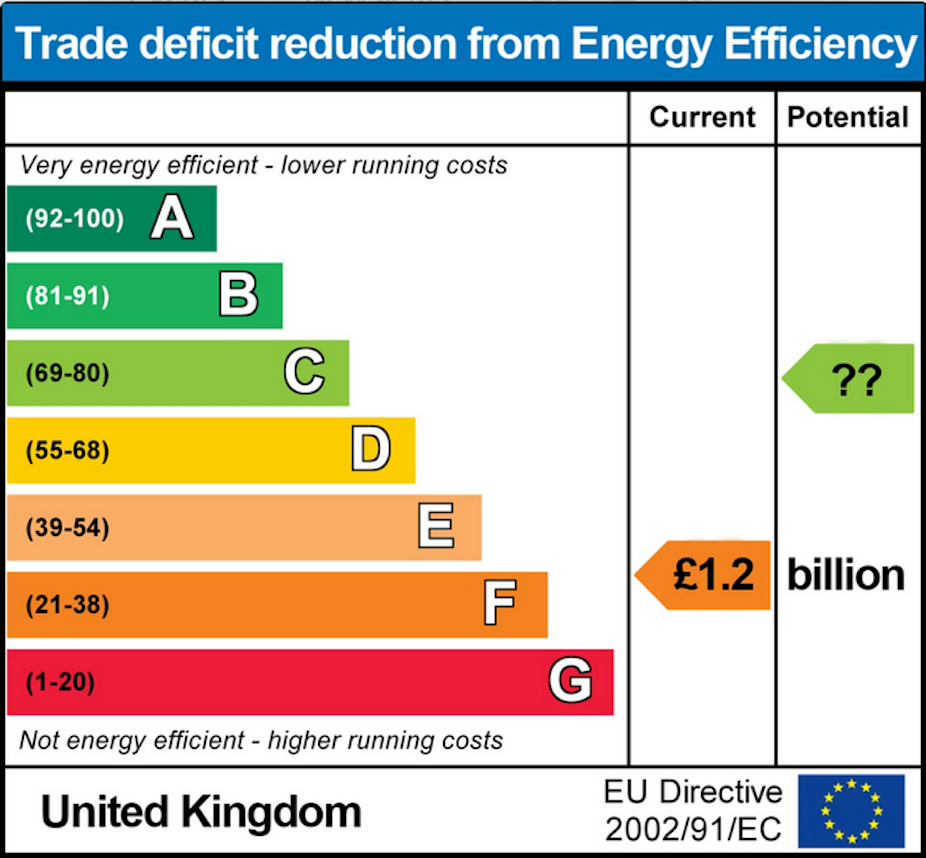We’ve just been through an unusually mild winter for the UK. Despite the excessive rain and storms, the warmer temperatures meant we’ve needed less energy to heat our homes.
This has reduced household energy bills, providing a welcome respite from ever increasing prices. But the weather has also had an undoubted benefit for the British economy, as we’ve had to import significantly less energy than would normally be the case.
Weather patterns are not under the control of legislators. But measures to promote energy efficiency are and could, if implemented on a large enough scale, produce an effect similar to a mild winter: warmer homes and less energy required to heat them. So just how big a difference did the weather make?
Mild winters are cheaper to run
Data released late last month from the Department of Energy and Climate Change (DECC) allows us to compare energy use during the two recent and contrasting winters: October 2013 to March 2014, which was unusually mild and the same period for 2012-13, which was colder than average. The data also enables us to compare the reduction in imports of primary energy during these periods, particularly coal and natural gas. These two fossil fuels are associated with electricity generation and heating – the areas most impacted by energy efficiency improvements in buildings.

The DECC data shows that companies generating electricity used nearly 5.6m less tonnes of coal during winter 2013-14, compared to winter 2012-13.
If we estimate, conservatively, that about 75% of the coal consumed is imported (there are only two deep coal mines still operational in Britain, Kellingley in Yorkshire and Thoresby in Nottinghamshire), this works out as a cut in coal imports of 3.9m tonnes, equivalent to 28,100 gigawatt hours (GWh) of thermal energy. At a cost of £70 per tonne, this represents a financial saving to the UK of £280m.
The reduction in demand for electricity was also felt by gas-fired and nuclear power stations, but to a less significant degree than coal, and the amount of electricity generated from wind increased. The reduction in the use of coal to generate electricity was due to a genuine overall drop in electrical demand, not just substitution of one fuel for others.
Other DECC data show a reduction of 83,000 GWh of natural gas consumed by the UK during the 2013-14 winter compared to 2012-13. The department’s statistics provide further detail on this reduction to show that overall imports were down by 60,000 GWh. This comprised 33,000 GWh less through the pipeline which runs across the Channel from Belgium, 19,000 GWh less from Norway, and 8,000 GWh less in the form of liquid natural gas by ship from Qatar. With wholesale natural gas costing around 1.5p per kWh, this adds up to a £900m saving from reduced natural gas imports.
Put the savings from coal and gas together, and we estimate that warmer-than-usual weather saved the UK nearly £1.2 billion in energy imports over the comparable six month period. This is a not inconsiderable sum – 3.5% of the 2012 UK trade deficit of £33.9 billion.
Why rely on the weather?
So if the vagaries of the British weather can cut primary energy imports and result in a clear economic benefit to the UK by reducing its trade deficit, this is to be rightly welcomed. Especially as the UK becomes even more dependent on imports for its primary energy supplies.
Why not then strive to ensure that these benefits are not just left to the weather, but could be enjoyed every year by improving buildings’ energy efficiency? It would seem an aim worthy of cross-party political support: reduce energy imports, improve the trade deficit, improve the UK’s housing stock and reduce fuel poverty.
Maybe it is time that the wider macro-economic benefits were included in the debate around energy efficiency. Given the potential for significant and lasting improvements to UK’s trade deficit, why shouldn’t the Bank of England provide long-term funding to support energy efficiency measures? Like an energy efficiency equivalent of a War Bond.
While cost is a major factor in the uptake of energy efficiency measures, there are also many non-financial barriers that have plagued schemes such as the Green Deal. Money spent on researching these factors for the benefit of advising legislators would be money well spent.
If greater energy efficiency could produce the £1.2 billion saving equivalent to the mild winter, but every year – regardless of the weather, the Treasury should recognise the value of energy efficiency and give it the same political support as it would to increase UK exports by £1.2 billion. And the more energy the UK has to import in the future, the more valuable this saving may become.
If ever there’s been a case of spend to save, this is it.

